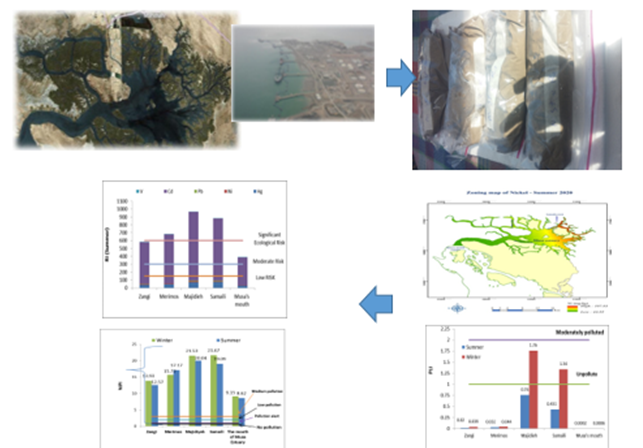
This study aimed to evaluate the pollution level of Ni, Pb, Cd, V, and Hg in the sediments of Musa Estuary and its four main tributaries namely Majidieh, Zangi, Semaili, and Merimos (collectively known as Mahshahr estuaries) in summer and winter 2019 using sediment quality indices. In each tributary, 4 stations were chosen to represent the estuary condition. One control point was also considered at the mouth of the estuary (17 stations in total). 51 sediment samples were collected using the Van Wien Hydrobius grab sampler and measurements were performed utilizing the ICP-MASS device. The heavy metals concentration was ordered as Ni> Pb> Cd> V> Hg and tributaries followed the order of Majidiyeh> Samaili> Zangi> Merimos> Musa's mouth (control point) in terms of heavy metal concentration in both seasons. Heavy metal concentrations were positively and significantly correlated with electrical conductivity and pH (P <0.05). The potential ecological risk (Er) was low for Ni, Pb, and V, moderate for Cd (except for Musa's mouth in summer (27.33)). Hg had low risk in Zangi Tributary and Musa's mouth in summer and medium risk in other tributaries in winter. The ecological risk index (RI) showed considerable risk in Zangi Tributary and Musa's mouth in both seasons and high risk in Merimos, Majidieh, and Samaili tributaries. According to the pollution load index (PLI), the sediments of Mahshahr estuaries showed no pollution in summer and moderate pollution in Majidiyeh and Smaili tributaries in winter. The Nemro Integrated Pollution Index ranged from 8.62 to 20.04 in summer and 9.15 to 21.53 in winter Mahshahr estuaries which indicate its high pollution potential. The findings of this research and those of previous studies alarm increasing levels of heavy metals’ content in the sediments of Mahshahr estuaries over the past years.
Total file downloads: 8